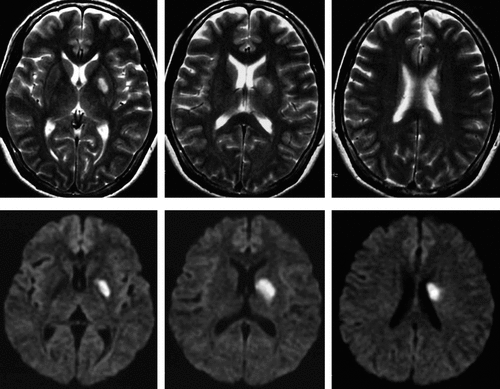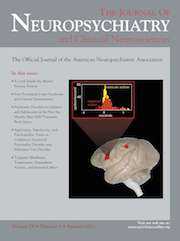Patient With Globus Pallidus Infarction Presenting With Reversible Dementia
To the Editor: A small single cerebral infarction can lead to dementia, which is known as “strategic infarct dementia.” Cases of strategic infarct dementia caused by strokes located in the globus pallidus are extremely rare, although those caused by strokes located in the angular gyrus and thalamus have been often reported. Here, we report the case of a patient with a small infarct of the left globus pallidus who presented with reversible cognitive impairment without motor deficits or involuntary movement.
Case Report
A 57-year-old, right-handed woman was admitted to our hospital with complaints of behavioral disturbance. The patient had been well until 1 day before admission, when she noted memory disturbance, mild disorientation, and word-finding difficulty. On admission, her level of consciousness was normal, and her Mini-Mental State Exam (MMSE) score was 24/30. There were no motor or sensory deficits. Neuropsychological assessment revealed mild impairments in attention, verbal fluency, memory, and frontal function. On T2-weighted and diffusion-weighted MR images, a small, high-signal-intensity lesion was observed in the left basal ganglia, mainly the left globus pallidus (Figure 1). A SPECT study showed a slight decrease in blood flow in the left basal ganglia without a decrease in the adjacent cortical blood flow. After admission, she was treated with anti-platelet agents, and her symptoms improved gradually. At her 1-month follow-up, the findings of neuropsychological evaluations were significantly improved, albeit with a residual slight memory deficit (Table 1).

T2-weighted (upper) and diffusion-weighted (lower) axial images show a small high-signal-intensity lesion in the left globus pallidus and a portion of the corona radiata.
| 5 Days After Admission | 29 Days After Admission | |
|---|---|---|
| Attention | ||
| Digit span | ||
| Forward | 6 (1/2) | 7 (1/2) |
| Backward | 4 (2/2) | 4 (2/2) |
| Intelligence | ||
| MMSE | 28 | 29 |
| RCPM | 30 | 35 |
| Memory | ||
| RAVLT | ||
| List A: 5 trials | 4/7/7/8/9 | 3/6/9/9/11 |
| List A: delayed recall | 6 | 8 |
| Frontal function | ||
| FAB | 12 | 15 |
| Phonemic Fluency (1 min.) | 5 | 7 |
| Modified Stroop Test | 17 sec | 16 sec |
Discussion
Vascular dementia is one of the most common forms of dementia in adults, and most cases are caused by a series of small strokes, named multi-infarct dementia (MID). On the other hand, a small single cerebral infarction can lead to dementia, the so-called strategic infarct dementia. The locations of the culprit lesion of strategic single infarct dementia include the left angular gyrus, inferomedial temporal lobe, medial frontal lobe, thalami, left capsular genu, and caudate nuclei. Cognitive impairment caused by unilateral globus pallidus infarction is very rare, although there have been a few reported cases in which lesions of the bilateral pallidal or striatal nuclei can cause cognitive disturbances with movement disorders.1–3 In the present case, there were impairments of general intelligence, memory, and frontal function without a decrease in cortical blood flow. These findings raise the possibility that damage of the globus pallidus affects not only the frontal lobe but also other areas important for cognitive functions, and leads to general cognitive disturbance and behavioral disorder.
1 : The behavioural and motor consequences of focal lesions of the basal ganglia in man. Brain 1994; 117:859–876Crossref, Medline, Google Scholar
2 : Unilateral lenticular infarcts: radiological and clinical syndromes, aetiology, and prognosis. J Neurol Neurosurg Psychiatry 1997; 63:611–615Crossref, Medline, Google Scholar
3 : Dementia mimicking a sudden cognitive and behavioral change induced by left globus pallidus infarction: review of two cases. J Neurol Sci 2008; 272:178–182Crossref, Medline, Google Scholar



